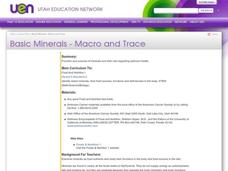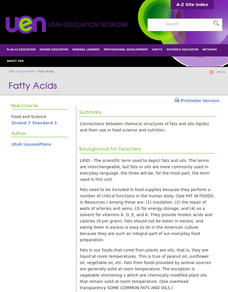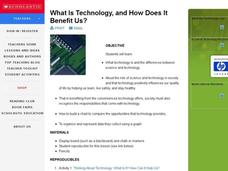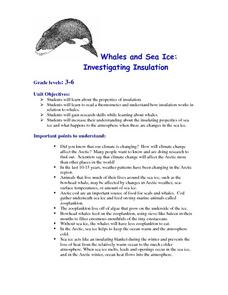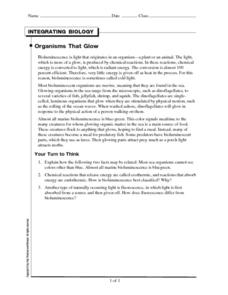Curated OER
Land Use Issues
Students discover seeds are a source of life. They also label the parts of a seed and examine the conditions which are needed for the seed to start growing. They follow the life cycle of seeds.
Curated OER
Make Way for Wild Migrants
Students discuss the threats facing migratory species and track the seasonal journeys of wildlife in real space and in cyberspace. Once they have gathered information from several sources, they create a portfolio to share with others...
Curated OER
Basic Minerals - Macro and Trace
Identify minerals, their sources, functions, and deficiencies in the body. National Standard 14.2.1 Discuss macro minerals, electrolytes, and trace minerals Identify the problems associated with calcium and iron
Curated OER
Fatty Acids
Identify the properties of fats and lipids. Compare the properties of saturated and unsaturated fatty acids Identify foods containing triglycerides and identify which foods contain saturated and unsaturated fat Discuss the function of...
Curated OER
Heat Loss and Cool Gains
Fifth graders predict what happens when cold and hot water are mixed together. In this physics lesson, 5th graders discuss how heat transfer takes place. They record temperature readings and compare it with their prediction.
Curated OER
WHAT'S ORGANIC?
Students explore how certain foods come to be certified "organic." They write the words "organic" and "synthetic" and given the definitions of each. Students are given dictionaries. They are asked: "What is organic food?" Students grow...
Curated OER
Eggs: A Practical Application
Apply food selection and preparation guidelines related to egg products. National Standard 14.3.3 Identify functions of eggs: binder, thickener, coating, leavening agent, emulsifier Identify egg cooking temperatures, techniques/methods:...
Curated OER
Plankton / Phytoplankton
Learners discuss the importance of plankton in the ocean ecosystem. For this biology lesson, students identify the different types plankton by observing them under the microscope. They explain how plankton population affect global climate.
Curated OER
Surrounded by Radiation
Students explore ways in which people are constantly exposed to naturally occurring and man-made sources of radiation. They create and play a board game featuring different hypothetical scenarios of radiation exposure.
Curated OER
Water, Water Everywhere (Pond Animals)
Second graders examine the characteristics of animals who live in a pond environment. In groups, they describe the various stages in the life of a frog and identify the characteristics of other pond animals. Using this information,...
Curated OER
Extra! Extra!
Students describe how plants and animals depend on each other. They see how living and nonliving environments change over time. They identify ways in which humans have changed their environment and the effects of those changes.
Curated OER
Animal and Plant Habitats
Second graders write and illustrate a story. In this habitats lesson plan, 2nd graders learn about different types of plant and animal habitats. Students view video segments about habitats, answer comprehension questions, complete a...
Curated OER
What Is Technology, and How Does It Benefit Us?
Young scholars examine and define what technology is as well as the differences between science and technology. They assess the role of science and technology in society, conveniences technology offers and create a chart to compare the...
Alabama Learning Exchange
Animals as Pets: Everything You Need to Know
Students complete internet based research on pet care in order to prepare a written and oral presentation for the class. They examine the life span, environment, food and grooming of the pet they chose to research. They complete the...
Curated OER
The Effects of Temperature Variations on the Heartbeat Rate of Daphnia
Young scholars use DigiScope technology to investigate Daphinia, popularly known as water fleas. They design, conduct, and report on an experiment to determine the effects of varying water temperatures on the heartbeat rate of Daphnia.
Curated OER
Plants In Space
In this biology activity, students grow corn plants in growth pouches as the control group in an experiment on plant growth in microgravity. Then they analyze any differences that occur between Earth-grown and space-grown corn plants.
Curated OER
Whales and Sea Ice: Investigating Insulation
Young scholars investigate the properties of insulation as it relates to whales and sea ice. They research whales and examine the atmospheric changes that occur when there are changes in sea ice.
Curated OER
Organisms that Glow
In this bioluminescence worksheet, students read about various organisms that glow on land and in the sea. They answer three critical thinking questions after reading about these chemical reactions.
Curated OER
Oklahoma's Berry Best
Ask your learners to complete activities related to Oklahoma's agriculture, berries in particular. The lesson is cross-curricular and has class members investigate an article about berries, write an acrostic poem, and discuss new...
Curated OER
Biological Diversity and Conservation
In this conservation biology worksheet, students will complete 9 short answer questions on the different strategies of conservation biology, including the Endangered Species Act and establishing protected areas for animals.
Curated OER
Seed Structure and Seed Dispersal
Third graders plant seeds. In this seed structure lesson, 3rd graders identify parts of a seed and plant a lima bean seed. Students discuss and reflect on the process in their journals.
Curated OER
Seed Diversity
Students explore agriculture by researching different seeds. In this seed identification instructional activity, students collaborate in small groups to analyze a package of different seeds. Students utilize a magnifying glass to examine...
Curated OER
Termite trails
Students observe termite trail-following behavior. Termites tend to follow lines made on paper by ballpoint pens because the ink contains a chemical that is similar to the trail pheromones used by termites to lead colony members to food...
Curated OER
DNA Blueprint for Life
Students isolate DNA from different food sources. In this biology instructional activity, students research DNA extraction. They analyze DNA stands collected from the lab, and compare the differences between each.




